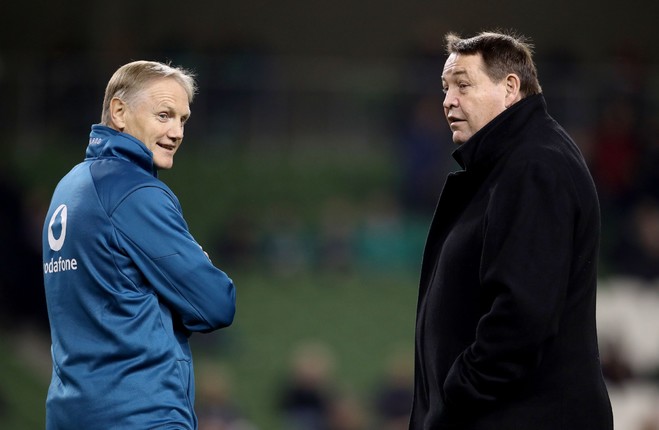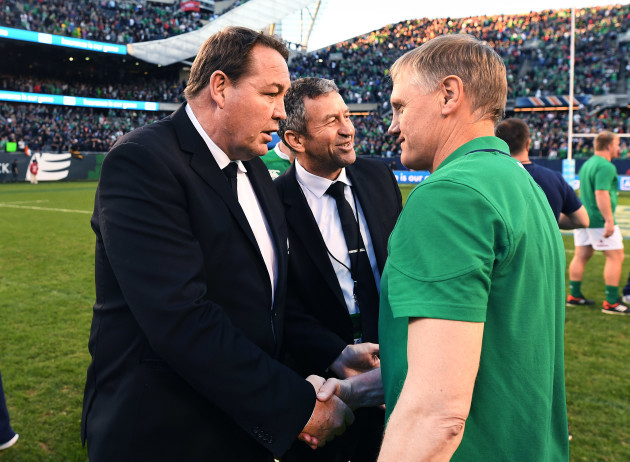RUGBY DOESN’T QUITE do coaching rivalries like soccer does, but in recent years Joe Schmidt v Steve Hansen has developed into a mini-version of the Alex Ferguson v Arsène Wenger struggle that dominated the English Premiership for so many years.
In one corner we have Schmidt, the studious tactician and outsider who has lifted a team to new heights during a golden era of success, building a legacy that will last far beyond his departure.
In the other corner, Hansen, a more gruff, tell-it-how-it-is coach who has delivered trophy after trophy over a sustained period of time while dipping into an endless supply of talent to keep his team top of the pile.
They first came face to face in 2013, and so far the scorecard reads 2-2, Ireland recording landmark wins in Chicago (2016) and Dublin (2018), with New Zealand victorious in Dublin twice (2013, 2016).
Schmidt was touted as Hansen’s potential successor last year, and reportedly turned down an approach to join his coaching ticket in 2017. There is a feeling Hansen hasn’t always received the credit he deserves, with his players instead lapping up the plaudits, whereas Schmidt has been widely lauded as a tactical genius following Ireland’s biggest wins.
This weekend will the be the fifth, and potentially final instalment in their rivalry, with both coaches set to step down from their posts following the World Cup.
The stakes have never been higher.
BACKGROUND
The two men come from opposite sides of New Zealand, with Hansen born on the South Island and Schmidt born and raised on the North Island. Hansen grew up wanting to be a jockey — his family bred and trained racehorses — but “grew out of that” before working as a freezing works inspector and as a police officer.
He played at centre for Canterbury before pursuing a career as a coach. Worked as an assistant coach at Crusaders between 2000-01, before taking on the Wales head coach job in 2002. He lost a record 10 games in a row before an encouraging World Cup campaign in 2003, which ended with a quarter-final exit to England.
Hansen returned to New Zealand as All Blacks assistant coach in 2004 and became head coach in 2011.
Schmidt worked as an English teacher in New Zealand, coming to Ireland to spend a year in Westmeath to gain overseas experience, and played his rugby for Manawatu. He got his first taste of coaching at Palmerston North High School in the early 90s, climbing up the ladder to work in assistant coach roles with Bay of Plenty, Auckland Blues and Clermont before his first head coach role with Leinster.
He spent three trophy-laden seasons with the province before stepping into the Ireland job.
RECORD
In terms of head-to-head meetings it’s honours even with the score tied at 2-2, but overall Hansen boasts the more impressive record. In total Hansen has steered the All Blacks to 88 wins in his 101 Tests as head coach, losing nine games and drawing four. That’s a win percentage of 87%.
While Schmidt hasn’t done too badly himself with Ireland, those are numbers that few could match. Schmidt has won 50 of his 69 games in charge, a return of 72%, and only drawn one. The key difference is that Schmidt has lost 18 games as Ireland boss, double the amount as Hansen.
HONOURS
Hansen has guided New Zealand to one World Cup (2015), and six Rugby Championship titles (2012, ’13, ’14, ’16, ’17, ’18). He has been named World Rugby Coach of the Year on four occasions (2012, ’13, ’14, 16).
Schmidt has won three Six Nations Championships with Ireland (2014, ’15 and ’18), and was World Rugby Coach of the Year last year.
STYLE
Hansen encourages a free-flowing attacking game powered by a massively aggressive forward pack. Often uses dual-playmaker system to break down increasingly defensive opposition set-ups.
Schmidt tends to stick to a more formulaic gameplan. Has reaped huge rewards when successful but criticised as being predictable and restrictive when results don’t go his way. His key strength is the training ground set-plays he holds for the big occasions, and he is certain to have a few tricks up his sleeve for this weekend.
MEDIA
Maybe the one area where the two men differ the most. The more mischievous Hansen loves the media, and for the most part the media loves him. While not quite at Eddie Jones’ level when it comes to verbal grenades, Hansen likes to sit down with the press at the start of a match-week in order to set the agenda.
This week was no different, with Hansen claiming he was happy to avoid Japan in the quarter-finals, and stating that he might be able lay a few traps for the famously studious Schmidt in order to “set him up”. He piled pressure on Ireland after their meeting last year by claiming Ireland were favourites for the World Cup.
Schmidt rarely engages in such mind-games. We normally don’t hear from the Ireland coach until the day he names his team, and even in post-match press conferences he rarely takes the bait, with his most cutting remarks perhaps often thinly-veiled criticisms of his own players, rather than digs at the opposition.
If Hansen’s press conferences can feel like light entertainment, Schmidt’s can veer towards lecture territory. The Ireland boss is no stranger to delivering lengthy, detailed answers that while often fascinating, don’t do headline writers any favours.
RELATIONSHIP WITH PLAYERS
Hansen backs his players to the very end, and they love him for it. Even those involved during his difficult spell as Wales boss remember him fondly. He famously defended former All Blacks captain Richie McCaw when his performances were being questioned, recently describing him as the only player he has come across who he thought “could do it week-in, week-out, regardless of who we were playing.” He’s come in for criticism for justifying his reason for selecting Sevu Reece in his World Cup squad. Reece had a contract with Connacht and the IRFU rescinded last year following a domestic violence incident.
Schmidt is clearly a hard task-master from the bits of information that occasionally leak out of the Ireland camp. We know the Monday morning video reviews can be particularly unpleasant, while a few players have mentioned how the Schmidt they see on the training pitch can be very different to the calm figure we see on matchdays.
Despite that, there have been no high-profile falling-outs with players, baring Simon Zebo’s omission once he signed for Racing 92. The respect towards the Ireland boss is clear whenever his players talk about him.
BIGGEST ACHIEVEMENT
Hansen is looking to become the first head coach to win successive World Cups after guiding New Zealand to the Web Ellis Cup in 2015, where the All Blacks survived a second-half fightback from Australia to win 34-17 at Twickenham.
Schmidt’s greatest achievement is potentially still ahead of him, with the last four years all geared towards breaking the quarter-final glass ceiling at this World Cup. In the meantime he’s delivered a string of milestone moments as he helped lift Ireland to top spot in the world rankings for the first time ever. Take your pick from beating New Zealand for the first time in 2016, repeating the feat on home soil two years later or winning the Grand Slam in 2018.
TYPICAL QUOTE
Q – What’s up your sleeve?
Hansen – Just my arm.
Q – After beating New Zealand, are Ireland now favourites for the World Cup? (2018)
Schmidt: “People will postulate about who is where and who is favourites. It’s a nebulous thing for us. All we can do is work hard and go out and put in a performance.”
WHAT THEY SAID
On Hansen: “I would look at him (towards the end of my career) and think about how busy he was, how many people he had to juggle, and think: ‘I don’t want to bother him’. He’s not a naturally open guy either, so we each ended up making a lot of assumptions about what we were thinking or feeling.” – Dan Carter, 2015.
“He doesn’t lose very much, so (winning) is pretty addictive for him.” – Micheal Cheika, 2017.
“There’s always a slight effort to try to wind you up a bit. I understand that. You’ve got to respect what he’s achieved.” – Warren Gatland, 2017.
On Schmidt:
“I think everybody sits there hoping one day he’ll come back and put himself back in the mix in New Zealand.” – Richie McCaw, 2018.
“At times, it’s almost like he’s a voice in my head. When I’m analysing my own game and I spot myself doing something wrong I can hear him pointing it out to me.” - Johnny Sexton, 2015.
“You could go to the team room at three in the morning to get a snack, and you might meet Joe crouched over a laptop.” – Tommy Bowe, 2018.
Ryan Bailey steps into the presenter’s chair where he’s joined by Murray Kinsella and Eoin Toolan on the line for Japan to tee up one of the biggest, if not the biggest week in Irish rugby: a World Cup quarter-final against back-to-back champions New Zealand.
The42 Rugby Weekly / SoundCloud


